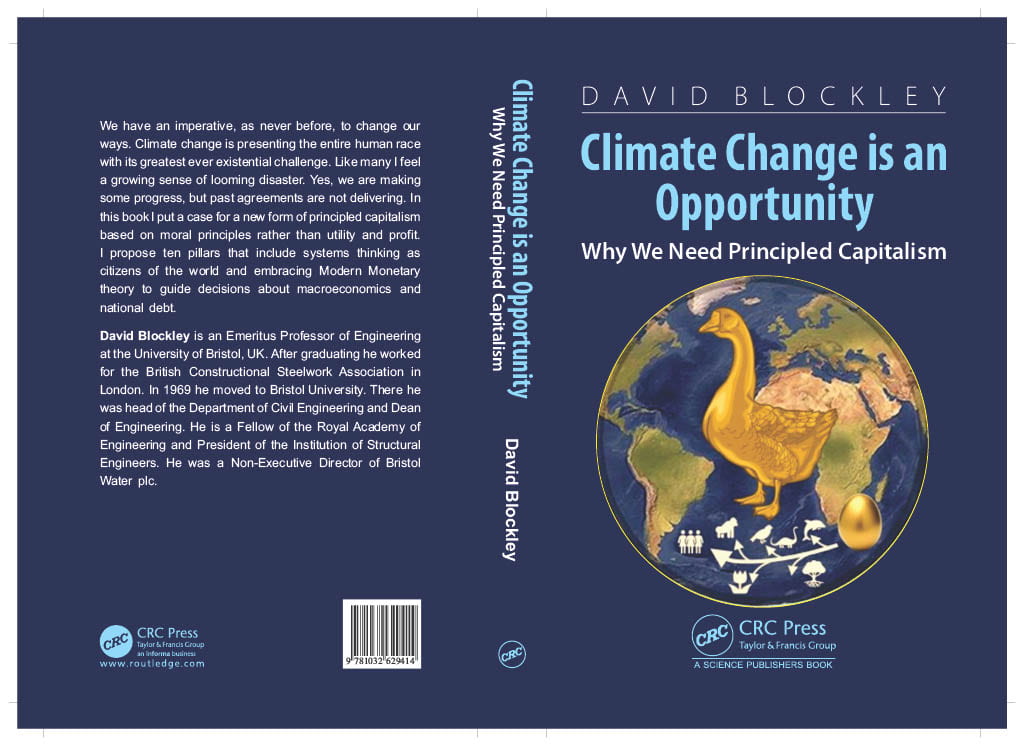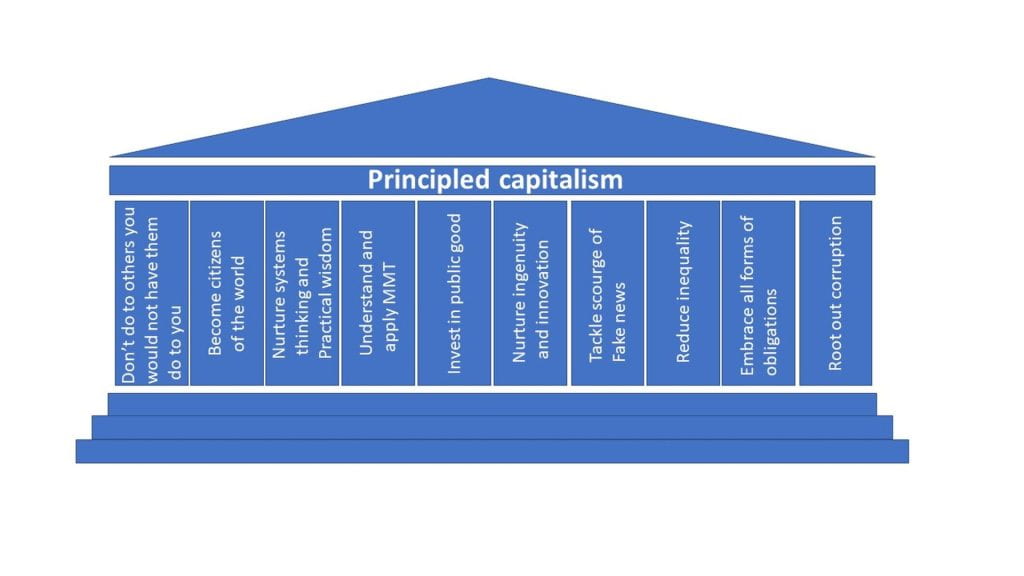Why we need principled capitalism
This is the cover of my new book due to be published by CRC Press (routledge.com)

An interview with Sabrina Phillips will tell you more
Climate Change: An Urgent Call for Principled Capitalism from Professor David Blockley – YouTube
We have an imperative, as never before, to change our ways. The entire human race is facing its greatest ever existential challenge. I wrote this new book because I feel a growing sense of looming disaster. Yes, we are making some progress through initiatives such as the ‘Green New Deal (GND)’ and the USA Inflation Reduction Act – so it’s not all gloom. The Intergovernmental Panel on Climate Change (IPCC) continues to provide important rigorous and balanced scientific information based on published literature. The UK and 77 other countries are committed to reaching ‘net zero’ greenhouse gas emissions by 2050.
The 2023 IPCC report states ‘There is sufficient global capital and liquidity to close global investment gaps……but there are barriers to redirect capital to climate action both within and outside the global financial sector.’ This latest announcement triggered the UN secretary Antonio Guterres to say ‘This report is a clarion call to massively fast-track climate efforts by every country and every sector and on every timeframe. Our world needs climate action on all fronts: everything, everywhere, all at once.’
Martin Wolf writes ‘Pessimism about humanity’s ability to address climate change is understandable. Time is limited, talk plentiful and action negligible. But we can only start from agreement that there is indeed a threat worth addressing….. despair is not an option.’
We know what we need to do. The problem is doing it. How do we convince our politicians that more urgency is needed? Governments and industry are reacting too slowly. One of the key messages of my new book is that fear of national debt is holding us back.
Yeva Nersisyan and L Randall Wray, and separately Richard Murphy, are showing us how we can pay for the Green Deal. Nersisyan and argue that the Green New Deal is MEOW (Moral Equivalent of War). The basis of their argument is that affordability cannot be an issue for the sovereign USA government (or any sovereign state with fiat currency. They write ‘The costs of extinction of the human species—from the point of view of humans, at least—is beyond measure. Even if we calculate the costs of the GND as $93 trillion over the next decade, that is puny in comparison with the discounted cost of total destruction of human life on planet Earth.’
Murphy has proposed green quantitative easing to kick start economic activity to deliver a new green deal.
Modern Monetary Theory (MMT) exposes some myths around government deficits and debt. I wonder if you have ever heard of fiat money. Most non-economists haven’t. It is of central importance in understanding the economies of the UK, USA and others. Fiat means by decree. Fiat money is a currency that is declared legal tender by a government that has no intrinsic or fixed value and is not backed by any tangible asset such as gold. In other words, the currency only has value because the government says it does. The stability of the currency depends on the stability of the country’s economy. The country has monetary sovereignty in that it can spend, tax, and borrow its own currency without promising to convert it into gold or foreign currency at a fixed price. The government issues the currency whilst the rest of us use it. Understanding fiat money enables us to see that the economics of a country that issues fiat money is fundamentally different from the economics of a household or any other users of that currency. The government issues the money via the banks and recoups much of it back through taxation. It can never go broke. Indeed, government deficits create a surplus in the private economy. Inflation only occurs when supplies aren’t sufficient to meet demands. The theory of MMT is largely based on accounting practice and the flow of money. The British economist Wynne Godley pointed out orthodox economics has inconsistent stock and flows. MMT uses balance sheets to make sure the stock flows are consistent as I explain in the book. Nersisyan and Randall Wray write ‘……we can afford the real MEOW. We already have the financial wherewithal needed to afford whatever is technologically possible. We do not need to go hat-in-hand to rich folks to get them to pay for it. We do not have to beggar our grandkids to pay for it. We do not have to borrow from China to pay for it.’
In the book I call for us to do three things. First to recognize we become what we think, and that we need to think differently to change social norms. Second, we must learn to test what we are told more rigorously to tackle misinformation and social manipulation. Third, we must act to build trust. To do these things I propose a new form of capitalism called principled capitalism. It can emerge out of current liberal capitalism if we widen the ideas of utility as personal satisfaction and the profit motive to include all forms of obligations to each other and to nature. An obligation as a root reciprocal moral principle for any society of more than two autonomous rational beings. Values are the things we hold as important in the way we live. In short, the worth of what is the ‘good.’ Values determine our personal priorities such as education, wellbeing, honesty, truthfulness, loyalty, open-mindedness, consistency, and our corporate values such as sustainability, efficiency, creativity, ingenuity, and innovation. To act with good faith is to act reasonably. This implies that consent is not withheld by any of the parties unreasonably, depending on context. Under the law of tort, a duty of care is owed by each one of us towards any other to adhere to a reasonable standard of behaviour that will do no harm. It is an expression of the social contract by which we live and work together.
Obligations are a root reciprocal moral principle found in the ‘golden rule’ of all religions ‘do unto others as you would have them do unto you’ (Luke, Ch. 6, v 31).
Climate change is a challenge and an opportunity – change we must if life on Earth is to survive as we know it. Meeting the challenge and taking to opportunities we can become citizens of the world defined by our interdependence and community. In my new book I suggest and discuss ten pillars of principled capitalism. Don’t do to others that you wouldn’t have them do to you, become citizens of the world, nurture systems thinking and practical wisdom, apply modern monetary theory, invest in the public good, nurture ingenuity and innovation, tackle fake news, reduce inequality, embrace all forms of obligation, and root out corruption.

I maintain that citizens of the world are ‘together people’ They recognize our interdependence and need for community. Being a world citizen is an active verb rather than a noun – a notion of doing something. Citizens look around, identify the domains they can influence, find collaborators, and engage with them. We must develop organizations to allow and encourage us to do so. The citizen story is a bigger story of who we are as human beings.

Truely a rich set of ideas and actions for all of us
Glad to see David Blockley’s blog is published on the UoB website, to reach minds of our students, our future leaders! I hope that our young generation will be inspired by the concept of Principled Capitalism and will be educated how to convert this concept into practice.